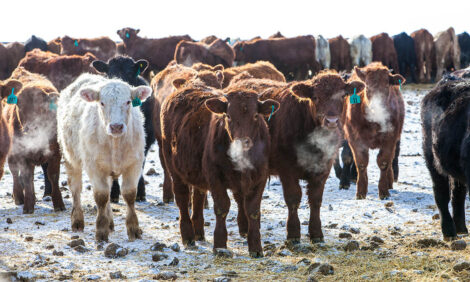



Australian Government Response To The Independent Review Of Australia’s Livestock Export Trade
As the Australian government reforms the live export trade after the Farmer Review, TheCattleSite looks at the government responses to the recommendations made in the review.The government notes that full implementation of the recommendations will require action by state and territory government and industry, as well as by the Commonwealth Government.
Full implementation of the recommendations will result in standards that are clearer and more effective, with transparent lines of responsibility between the Commonwealth, state and territory governments for regulating the supply chain, and a through-chain industry QA system that complements government regulation.
The Review recommends that the Australian Government expedite work with the states and territories to more clearly articulate respective roles and responsibilities for regulating the livestock export supply chain.
The Australian Government agreed in principle with this and will work with state and territory governments through appropriate Ministerial and senior official forums to clarify roles and responsibilities for the regulation of animal welfare along the livestock export supply chain in Australia.
The Review recommends that the Australian Government urge the states and territories to develop and implement, as a priority, enforceable standards of welfare to replace Codes of Practice, incorporate the standards into legislation and prepare and implement compliance programmes to monitor and enforce the regulations in the domestic phase of the livestock export trade.
Cattle, sheep and goat welfare standards should be produced as a priority for incorporation into state and territory legislation.
Again agreeing in principle, the Australian Government will work with state and territory governments through appropriate Ministerial and senior official forums to develop animal welfare standards that, when fully implemented, are nationally consistent and enforceable under jurisdictional legislation.
The Review recommends that in line with the Australian Standards for the Export of Livestock (ASEL), industry develop and implement a through-chain QA system to complement government regulatory compliance programmes.
Agreeing in principle, the Australian Government is supportive of the development and implementation of industry led quality assurance systems that would, in conjunction with government regulatory compliance programmes, better protect the health and welfare of animals along the entire livestock export supply chain. The government encourages industry to accept this recommendation and will provide advice to industry to assist.
The Australian Government Department of Agriculture, Fisheries and Forestry will review the current inspection arrangements for livestock exports from Fremantle to ensure equivalence with existing and future requirements of the Australian Standards for the Export of Livestock (ASEL).
The Review recommends that the current inspection regime from Fremantle be reviewed, to ensure that thorough individual animal inspection by the AAV is conducted.
The Australian Government Department of Agriculture, Fisheries and Forestry agreed with this and will review the current inspection arrangements for livestock exports from Fremantle to ensure equivalence with existing and future requirements of the Australian Standards for the Export of Livestock (ASEL).
The Review recommends that the existing system of exporters contracting AAVs and stockpersons be supplemented by the following provisions:
- Enhanced auditing processes including targeted on-site (including shipboard) audit
- Daily and end-of-voyage reports to be forwarded to AQIS and the exporter simultaneously
- Enhanced training and induction processes for AAVs
- Consideration by industry of enhanced training and mentoring programs for stockpersons
Agreeing, the Australian Government will implement additional measures to improve the operation of AQIS-accredited veterinarians (AAV) for livestock exports. The additional measures include strengthening auditing arrangements used to assess the performance of AAVs, enhanced training and induction processes, as well as AAVs submitting reports directly to AQIS at the same time such reports are transmitted to the exporter. The Australian Government supports efforts by industry to enhance training, induction and mentoring processes for stockpersons. In addition, the shipping standards relating to the export of livestock will be subject to review under the following:
- Review of the existing Australian standards for the export of livestock; and
- The Australian Maritime Safety Authority's review of Marine Orders Part 43.
The Review recommends that a comprehensive review of ASEL be undertaken.
The review should inter alia examine the policy on export of sheep from southern ports to the Middle East in winter months, with a view to:
- mitigate feedlot and shipboard losses in adverse weather conditions
- mitigate losses from heat stress and inanition during the voyage.
- The review should also consider additional specific criteria, identified in recent industry-funded research, for selection of suitable livestock for export.
Agreeing, the Australian Government will undertake a comprehensive review of the Australian Standards for the Export of Livestock (ASEL) to determine improvements that can be made to the standards, taking into account information and findings of the review and recent research of relevance.
The review recommends that the role and function of the Livestock Export Standards Advisory Group should be reviewed.
Agreeing, the Australian Government will review the role and function of the Livestock Export Standards Advisory Group.
The Review recommends that the Australian Government should work with the states and territories and industry to implement individual identification of all sheep and goats as soon as practicable.
As a priority, current exemptions applying to export cattle from the Northern Territory and Western Australia should be removed.
The Australian Government agreed in principle and will continue to work with the state and territory governments to develop and implement a unique animal identification system for sheep and goats.
The Australian Government has been consulting with the Western Australian and Northern Territory Governments to remove existing exemptions of certain cattle from the National Livestock Identification System.


